Compatibility of watermelon with milk and other products
Watermelon most often eaten in large portions as an independent product. However, sometimes the pulp is used in salads, desserts, and combined with various drinks, including coffee and milk. In addition, the fruits are pickled and canned, eaten with bread or cheese.
The compatibility of watermelon with milk and other products depends on many factors: the size of portions, meal times, and the presence of chronic diseases of the digestive system.
Compatibility of watermelon and milk
The absorption of foods depends on their composition and the individual characteristics of the body.
About milk
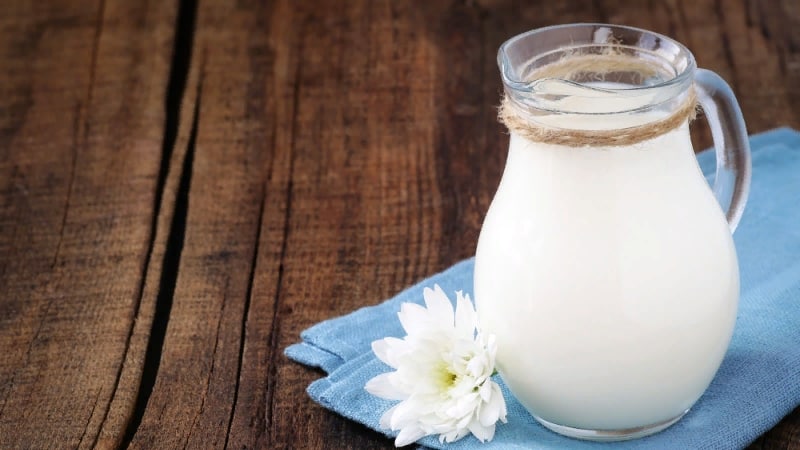
Milk contains 10% of the daily value of proteins, fats and carbohydrates, calcium, phosphorus and vitamin D.
However, the product has negative properties:
- Milk fat is beef refractory fat, which is poorly absorbed by the body. Excess milk consumption increases the risk of cardiovascular disease.
- Industrial milk contains hormones that are added to the cow's food so that the animal is milked all year round, and not 180 days, as nature intended. This milk increases the risk of developing prostate cancer.
- Every fourth person on Earth suffers from a milk allergy. Cow protein is difficult to digest, and children tolerate it more easily than adults.
It is better to choose a product with low fat content or dilute whole milk with water. It takes 1.5-2 hours to digest milk in the stomach. After boiling, the absorption time of the product increases.
Important! Milk causes fermentation processes in the intestines. It is not recommended to combine it with rye bread or sour fruits. Milk protein does not combine well with other animal proteins. Do not drink this drink with meat, poultry or fish dishes.
For diseases of the digestive system, it is better to dilute milk with water or add it to tea or coffee. Product intolerance is caused not only by food allergies, but by pathologies of the liver and gall bladder.
Followers of a separate diet quite rightly consider milk to be food, and therefore advise drinking it separately from other foods.
This is interesting:
The best recipes with onions and milk for children's cough.
The best recipes for feeding cucumbers with milk and iodine.
About watermelon
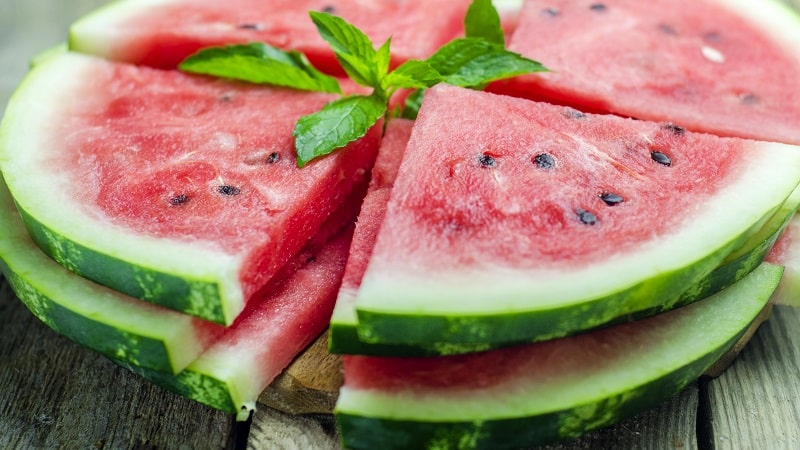
Most of the fruit, 89% to be exact, is water. If you exclude the hard crust, then in the pulp this ratio will be even greater. A smaller proportion consists of fiber, pectin and other substances:
- Lycopene, which gives the pulp its rich red or pink color. This is a unique antioxidant that prevents the development of cancer.
- Arginine promotes vasodilation and lowers blood pressure.
- Vitamins A, groups B, C, PP.
- Folic acid.
- Potassium, calcium, magnesium, phosphorus.
Useful substances are contained in small quantities. To get the daily requirement of vitamins and microelements, you will have to eat kilograms of watermelon.
Important! Recent studies have shown that with a low calorie content (only 38 kcal per 100 g), watermelon does not contribute to weight loss. The pulp contains a large amount of simple carbohydrates or sugars, glycemic index fruit 70-80 units. After such a delicacy, a person’s appetite awakens.Using fruits in weight loss diets has the opposite effect.
The high concentration of sugars causes another negative effect of watermelon. It is believed that it removes waste and toxins, helping to cleanse the body. In fact, a large amount of sweet pulp is an increased burden on the kidneys. The body starts the process of removing sugar, and the urinary system works in emergency mode.
In reality, the cleansing effect of the fruit is negligible compared to other fruits and vegetables due to the low fiber and pectin content of the pulp. A negative effect occurs when overeating. For an adult, the healthy serving size is 200 g.
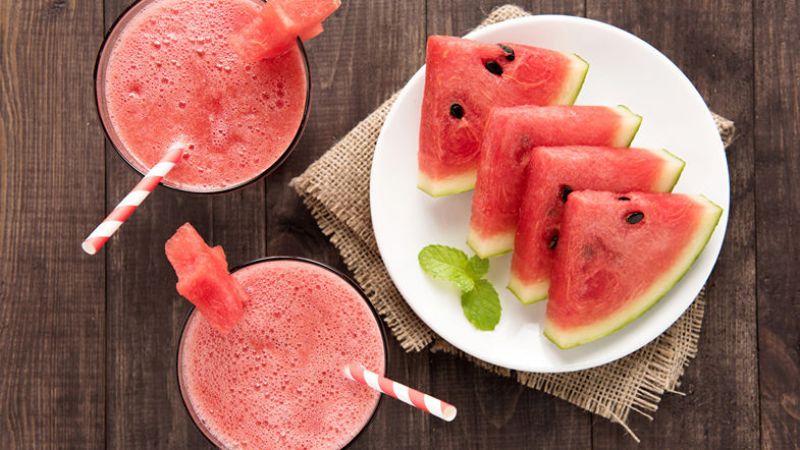
Is it possible to eat watermelon before and after milk?
The founders of the theory of separate nutrition, G. Shelton and W. Hay, believed that each type of food required a different composition and volume of digestive juices, a different level of acidity. Scientists recommended consuming milk, watermelon, and melon separately from other foods.
Milk interferes with digestion and is absorbed not in the stomach, but in the duodenum. Opponents of separate nutrition speak about the universality of the digestive system and the lack of scientific justification for the method of separate nutrition.
Watermelon is quickly digested - within 20-30 minutes. Therefore, it is better to eat the fruit before drinking milk, which takes much longer to digest. In this case, it is better to drink a drink with a low fat content, otherwise this combination will lead to weight gain.
Attention! Sweet watermelon juice provokes fermentation processes in the intestines, so drinking milk and fruit together will lead to intestinal dyspepsia, i.e. disruption of its normal functioning.
Compatibility of watermelon with other dairy products
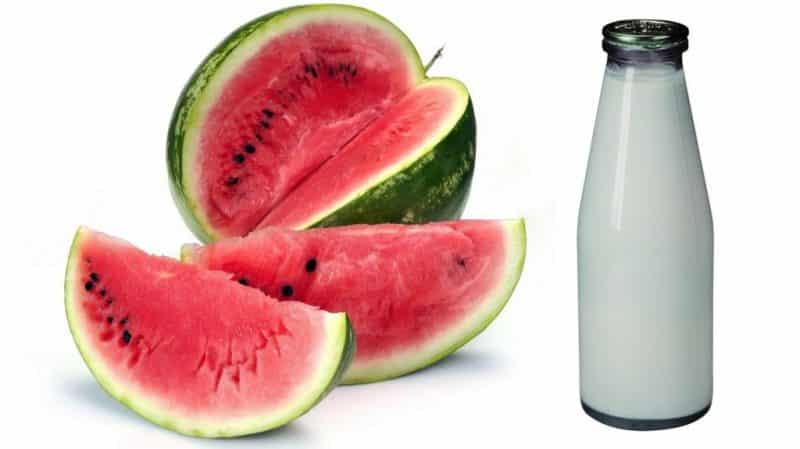
Milk derivatives are digested better and faster. Fermented milk products are successfully combined with fruits and vegetables and improve the absorption of fat-soluble vitamins A and E, which are also found in watermelon.
With kefir, cottage cheese and other fermented milk products
Fermented milk products are digested faster than whole milk. Kefir is processed within 30 minutes and speeds up the digestion process. Watermelon and fermented milk products are a good combination, especially if you don’t overeat.
Cottage cheese and sour cream promote the absorption of vitamin A. Thanks to vitamin D in watermelon, calcium is better absorbed. Therefore, it is better to replace the milkshake with watermelon yogurt.
Sometimes pieces of watermelon are used in salads with cheese. In small quantities, this combination will not affect the digestion process. However, excessive consumption of watermelon in combination with salty cheese will lead to swelling.
What foods can you combine watermelon with?
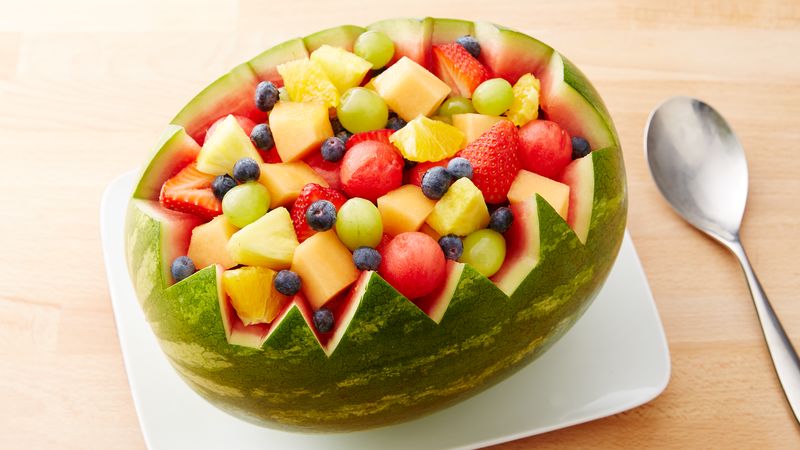
Sweet and moderately sour fruits are what watermelon goes best with:
- grape;
- banana;
- persimmon;
- blueberry;
- currant;
- sweet varieties of cherries and sweet cherries;
- raspberries;
- sweet apples.
Watermelon goes well with dried fruits. It is most successful to use the listed fruits to create canapés. The fruit is used with any vegetables in salads. The best dressing would be vegetable oil or sour cream. It is permissible to combine the fruit with nuts.
What drinks can be combined with?
Watermelon is compatible with unsweetened drinks. Tea, coffee without sugar with fruit salad will not cause digestive problems. Watermelon will reduce the stimulating effect of caffeine on the nervous system. Such food does not significantly affect blood pressure, just do not overeat.
Unfortunate food and drink combinations with watermelon
Watermelon does not go well with sour fruits and vegetables: tomatoes, citrus fruits, sour apples, currants, pomegranate. It is not recommended to eat it with pickled, canned and fermented foods.
Also among the unsuccessful combinations are:
- meat, fish, poultry;
- cereals, potatoes;
- bakery products;
- eggs;
- salty cheeses.
It is undesirable to use watermelon when preparing sweet desserts due to the high concentration of sugars. It should not be eaten with salty foods either. Sodium prevents the removal of fluid and its combination with a juicy berry will cause the threat of edema.
Also, you should not use watermelon as a dessert after the main meal. The pulp is quickly digested, but will be retained by the rest of the food. This will lead to the development of fermentation and rotting processes in the intestines.
Combinations of the fruit with drinks that cause fermentation processes: kvass, carbonated water, beer will be unsuccessful. Sweet juices will lead to an increase in the amount of sugar that is already contained in the fruit pulp.
Conclusion
The compatibility of watermelon depends on the method of its use. In the form of small pieces, it is added to salads, washed down with tea, coffee or dairy products. Less successful will be the compatibility of the fetus with milk, which is more difficult to digest.
It is better to eat watermelon in large quantities separately from the rest of the food. Sweet pulp increases blood sugar, increases appetite, and creates additional stress on the kidneys.